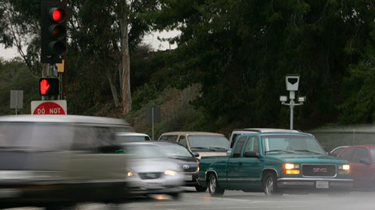Two much-debated City Hall issues are expected to converge this week when the Los Angeles Police Department's red light camera program moves to the front of the line for an exemption from the city's contracting boycott of Arizona over that state's new immigration enforcement law.

The council's Public Safety Committee says red light cameras provide a "significant benefit to public safety." (Gary Friedman, Los Angeles Times / May 13, 2008)
On Tuesday, the City Council is scheduled to consider - and appears likely to approve - an exception to the boycott allowing a 10-month extension of a multimillion-dollar agreement with Scottsdale-based American Traffic Solutions.
The firm operates cameras at 32 city intersections that catch tens of thousands of red light violators each year. The council's Public Safety Committee says the exception is justified because red light cameras provide a "significant benefit to public safety."
Critics and some researchers have challenged the safety benefits of photo enforcement systems, arguing that they appear primarily designed to generate revenue for private firms and cities.
The boycott exemption request comes as a new financial analysis of Los Angeles' red light camera program has found it is costing the city about $300,000 a year.
Last month, a lopsided majority of the council and Mayor Antonio Villaraigosa suspended most travel and contracting with Arizona in protest over a new state law requiring police officers to determine the status of people they lawfully stop and also suspect are in the country illegally. The law encourages racial profiling and violates constitutional rights, according to Los Angeles officials, a charge Arizona's governor and other backers of the law deny.
In addition to extending the current red light camera agreement, the council is scheduled to consider asking for bids on a new contract to operate and expand the photo enforcement program to more intersections starting next year.
That action could further entangle the two issues. In addition to the current vendor, a top competitor for the new contract - Redflex Traffic Systems - also has its headquarters in Arizona.
"Industry wide, they're two front runners," noted Matthew Crawford, a senior administrative analyst in the city's budget office.
Councilman Ed Reyes, whose district stretches from Koreatown to Lincoln Heights, has been an outspoken supporter of the boycott. But he said he would support the one-time exemption to temporarily continue the contract and prevent a sudden shutdown of the traffic enforcement program. "I would not jeopardize Angelenos," he said.
But he said he would press the city to examine alternatives to issuing a new, larger contract to an Arizona-based firm. One option, he said, could be to use the city's contracting power to lure existing vendors to the Los Angeles area. Or the city could help new local companies develop the capacity - and jobs - to provide photo enforcement equipment and services. "I want to be opportunistic with these dollars and nurture new business and bring in new jobs," he said. "This would be a classic case for that."
LAPD Lt. Ron Katona, who oversees the camera enforcement program, said the department wants to maintain the program. He said that the boycott is likely to be a factor in choosing a new contractor but that he doubted the city would select a firm that was rated poorly or was far more costly just because it was not in Arizona.
In Southern California, there are basically three firms providing red light cameras to several dozen local governments. Redflex has the most contracts, followed by American Traffic Solutions and Texas-based Affiliated Computer Services, a Xerox subsidiary.
Despite fines and fees for running red lights, which can total more than $500, the city's chief administrative officer this month issued a report concluding that the camera enforcement program costs about $300,000 a year after all income is considered. Most of the fines and fees paid by motorists go to the state and courts. American Traffic Solutions receives up to $3.1 million annually under the contract, the report says.
Supporters of the program say there are indirect savings because there are fewer accidents, injuries and deaths, and there are benefits from freeing up traffic patrol officers for other tasks. And the city report says public safety benefits cited in a recent LAPD study justify continuing the program.
Last week, what could have been the first exemption from the boycott - an LAPD request for officers to attend an Arizona training conference - was withdrawn after some council members voiced concern. This prompted the police officers' union to complain that political correctness at City Hall was taking precedence over public safety.











